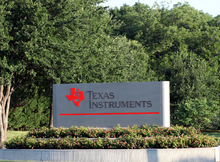32°54′40″N 96°45′08″W / 32.9110°N 96.7523°W
 | |
 Sign at TI's Dallas headquarters | |
| Company type | Public |
|---|---|
| |
| Industry | Semiconductors |
| Predecessor | Geophysical Service |
| Founded | 1930 (as Geophysical Service Incorporated)[1] 1951 (as Texas Instruments) |
| Founders | |
| Headquarters | Dallas, Texas, U.S. |
Key people | Haviv Ilan (chairman, president, CEO)[2] Ahmad Bahai (CTO)[3] |
| Products | |
| Revenue | |
| Total assets | |
| Total equity | |
Number of employees | 34,000 (2023) |
| Website | ti.com |
| Footnotes / references [4] | |
Texas Instruments Incorporated (TI) is an American multinational semiconductor company headquartered in Dallas, Texas.[5] It is one of the top 10 semiconductor companies worldwide based on sales volume.[6] The company's focus is on developing analog chips and embedded processors, which account for more than 80% of its revenue.[7] TI also produces digital light processing (DLP) technology and education technology[7] products including calculators, microcontrollers, and multi-core processors.[8]
Texas Instruments emerged in 1951 after a reorganization of Geophysical Service Incorporated, a company founded in 1930 that manufactured equipment for use in the seismic industry, as well as defense electronics.[9] TI produced the world's first commercial silicon transistor in 1954,[10] and the same year designed and manufactured the first transistor radio. Jack Kilby invented the integrated circuit in 1958 while working at TI's Central Research Labs. TI also invented the hand-held calculator in 1967, and introduced the first single-chip microcontroller in 1970, which combined all the elements of computing onto one piece of silicon.[11]
In 1987, TI invented the digital light processing device (also known as the DLP chip), which serves as the foundation for the company's DLP technology and DLP Cinema.[11] TI released the popular TI-81 calculator in 1990, which made it a leader in the graphing calculator industry. Its defense business was sold to Raytheon Company in 1997; this allowed TI to strengthen its focus on digital solutions.[12] After the acquisition of National Semiconductor in 2011, the company had a combined portfolio of 45,000 analog products and customer design tools.[13] In the stock market, Texas Instruments is often regarded as an indicator for the semiconductor and electronics industry as a whole, since the company sells to more than 100,000 customers.[14][15][16]
- ^ "Investor FAQs". Texas Instruments. Archived from the original on January 27, 2007. Retrieved January 29, 2007.
- ^ "Rich Templeton to reassume President and CEO roles in addition to his current role as Chairman; Brian Crutcher resigned as CEO". PR Newswire (Press release). Retrieved July 17, 2018.
- ^ Bahai, Ahmed (2015). "Innovation in Power Electronics" (PDF). SEMICON West. Texas Instruments. Retrieved October 23, 2019.[permanent dead link]
- ^ "US SEC: 2023 Form 10-K Texas Instruments, Inc". U.S. Securities and Exchange Commission. February 2, 2024.
- ^ "TI Mailing Address Archived February 19, 2009, at the Wayback Machine." Texas Instruments. Retrieved on June 12, 2009.
- ^ "Top semiconductor companies sales 2012–2015 | Statistic". Statista. Archived from the original on July 5, 2016. Retrieved July 8, 2016.
- ^ a b "About TI – Technology and innovation – TI.com". www.ti.com. Archived from the original on July 12, 2016. Retrieved July 8, 2016.
- ^ "TI Fact sheet | Who we are | Company | About TI". www.ti.com. Archived from the original on July 19, 2016. Retrieved August 1, 2016.
- ^ "Texas Instruments – Low Bandwidth Timeline – Key TI Events". www.ti.com. Archived from the original on June 29, 2016. Retrieved July 8, 2016.
- ^ ScienCentral. "The First Silicon Transistor". www.pbs.org. Archived from the original on November 2, 2017.
- ^ a b "About TI – History – TI.com". www.ti.com. Archived from the original on July 10, 2016. Retrieved July 8, 2016.
- ^ "TI IR – CI – AD – Raytheon Purchases Defense Systems and Electronics Business". www.ti.com. Archived from the original on August 15, 2016. Retrieved July 8, 2016.
- ^ "Texas Instruments Closes $6.5B Acquisition Of National Semiconductor". September 23, 2011. Archived from the original on September 24, 2011. Retrieved September 23, 2011.
- ^ "Texas Instruments' Forecast Stokes Optimism for a Chip Revival – BNN Bloomberg". April 23, 2019.
- ^ Bary, Emily. "It's not just Texas Instruments, Morgan Stanley warns". MarketWatch.
- ^ Morra, James (January 27, 2022). "TI Sees Strong Chip Demand Ahead Amid Production Ramp-Up". Electronic D. Retrieved January 30, 2022.